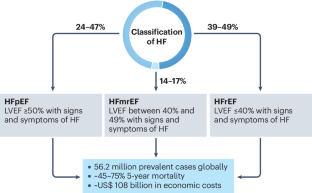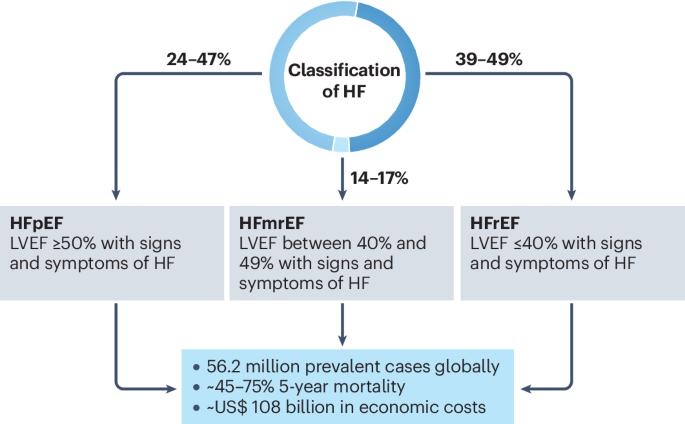心力衰竭的全球流行病学。
IF 41.7
1区 医学
Q1 CARDIAC & CARDIOVASCULAR SYSTEMS
引用次数: 0
摘要
心力衰竭(HF)是一种异质性临床综合征,发病率和死亡率都很高。心力衰竭的自然病史已经明确,但由于人口结构的变化、治疗方法的进步以及医疗服务的不同,流行病学数据也在不断变化。尽管在过去十年中,高收入国家的心房颤动发病率趋于稳定或有所下降,但由于人口老龄化、风险因素增加、新型疗法的有效性以及生存率的提高,心房颤动的发病率仍在继续上升。这种发病率的上升越来越多地出现在年轻成年人中,并伴随着向射血分数保留型心房颤动的转变。然而,由于缺乏中低收入国家的全面数据,我们对这些国家的心房颤动负担和进展的流行病学理解存在差异。因此,当前的心房颤动流行病学状况凸显了针对地理位置脆弱地区进行定期监测和资源分配的必要性。在本《综述》中,我们将重点介绍全球心房颤动负担的趋势,并关注左心室射血分数的变化。我们还讨论了不断变化的基于人群的高血压发病率和流行率估计值、该疾病的风险因素和病因,以及不同地理区域和人群的预后。本文章由计算机程序翻译,如有差异,请以英文原文为准。


Global epidemiology of heart failure
Heart failure (HF) is a heterogeneous clinical syndrome marked by substantial morbidity and mortality. The natural history of HF is well established; however, epidemiological data are continually evolving owing to demographic shifts, advances in treatment and variations in access to health care. Although the incidence of HF has stabilized or declined in high-income countries over the past decade, its prevalence continues to increase, driven by an ageing population, an increase in risk factors, the effectiveness of novel therapies and improved survival. This rise in prevalence is increasingly noted among younger adults and is accompanied by a shift towards HF with preserved ejection fraction. However, disparities exist in our epidemiological understanding of HF burden and progression in low-income and middle-income countries owing to the lack of comprehensive data in these regions. Therefore, the current epidemiological landscape of HF highlights the need for periodic surveillance and resource allocation tailored to geographically vulnerable areas. In this Review, we highlight global trends in the burden of HF, focusing on the variations across the spectrum of left ventricular ejection fraction. We also discuss evolving population-based estimates of HF incidence and prevalence, the risk factors for and aetiologies of this disease, and outcomes in different geographical regions and populations. In this Review, Khan and colleagues explore the evolving global epidemiology of heart failure (HF), focusing on changes in incidence and prevalence across the spectrum of left ventricular ejection fraction. The authors highlight the disparities in our understanding of HF epidemiology in low-income and middle-income countries, affirming the need for improved surveillance and resource allocation in vulnerable areas and populations.
求助全文
通过发布文献求助,成功后即可免费获取论文全文。
去求助
来源期刊

Nature Reviews Cardiology
医学-心血管系统
CiteScore
53.10
自引率
0.60%
发文量
143
审稿时长
6-12 weeks
期刊介绍:
Nature Reviews Cardiology aims to be the go-to source for reviews and commentaries in the scientific and clinical communities it serves. Focused on providing authoritative and accessible articles enriched with clear figures and tables, the journal strives to offer unparalleled service to authors, referees, and readers, maximizing the usefulness and impact of each publication. It covers a broad range of content types, including Research Highlights, Comments, News & Views, Reviews, Consensus Statements, and Perspectives, catering to practising cardiologists and cardiovascular research scientists. Authored by renowned clinicians, academics, and researchers, the content targets readers in the biological and medical sciences, ensuring accessibility across various disciplines. In-depth Reviews offer up-to-date information, while Consensus Statements provide evidence-based recommendations. Perspectives and News & Views present topical discussions and opinions, and the Research Highlights section filters primary research from cardiovascular and general medical journals. As part of the Nature Reviews portfolio, Nature Reviews Cardiology maintains high standards and a wide reach.
 求助内容:
求助内容: 应助结果提醒方式:
应助结果提醒方式:


